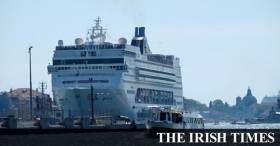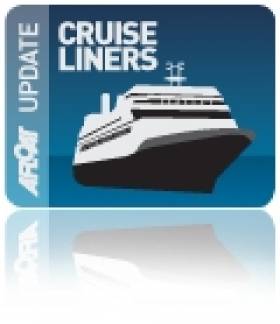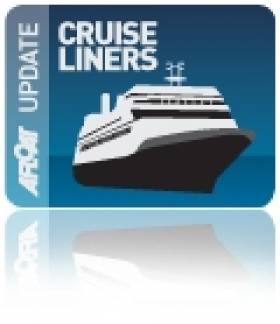Displaying items by tag: MSC Cruises
A family from Ireland were caught up in a cruise ship collision with a tourist boat in Venice has hit out at the company’s treatment of passengers left stranded in the aftermath of the accident.
As The Irish Times reports, Charlie and Anne Lumsden and their daughter Nichola were on board the MSC Opera when it into the dock and a smaller tourist boat as it approached the Giudecca canal in the city.
Mr Lumsden said they were on deck, going for breakfast before their departure after a week-long cruise when the accident occurred. “We didn’t feel the collision,” he said, but the alarm went off and staff rushed up stairs and along each deck.
The incident happened at 8.30am and Mr and Mrs Lumsden were due to fly back to Dublin at 12.15, but nobody was allowed off the vessel until 2.50pm until the port authorities had finished their investigations, he said.
In the end they had to organise and pay for their alternative flights on Monday, overnight accommodation in a hotel outside Venice and taxis at a cost of about €1,500.
For more on this story, click here.
#CruiseLiners – The cruise and ferry industries were among those gathered at the annual Irish Travel Industry Awards held in association with Aer Lingus.
The prestigious gala awards of the Irish Travel Agents Association (ITAA) ceremony took place recently in the Mansion House, Dublin, where more than 500 travel and tourism professionals from around the world attended. Adding to the glamour, broadcaster, Miriam O’Callaghan was this year's Master of Ceremonies.
Among the big winners on the night from the cruise and ferry industries, were MSC Cruises that was awarded ‘Best Main Stream Cruise Company’. This category has been dominated by Miami USA based, Royal Caribbean since the awards were inaugurated in 2011. The Italian founded Mediterranean Shipping Company are a global cruise operator based in Switzerland.
Irish Ferries took the title for ‘Best Ferry Company’ which Afloat adds is the eight-consecutive year that the Dublin based transport shipping company has won this award. Voting in this category of the annual ITAA awards that began also eight years ago, were cast by travel agents and their staff from across Ireland.
In the overall ITAA awards, Manning Travel, who are based in Kilkenny, won the title of ITAA Travel Agency of Year 2018 with under ten employees, whilst Tour America was crowned the ITAA Travel Agency of Year 2018 with over ten employees. Both of the winning agencies were praised for their stand-out customer service, their first-rate expertise and the wide range of travel options available to customers.
The annual event is designed to showcase excellence within the industry and the difficult job of judging the Member Award Winners falls to an independent panel of judges, chaired by Bill Smith. Supplier Award Winners were voted upon by Irish travel agents.
The awards are an initiative of the ITTA in association with Aer Lingus, and supported by Travelsavers, Travelcentres and Worldchoice.
Listed below are the award winners exclusively from those of the cruise and ferry industries.
CRUISE & FERRY CATEGORY - SPONSORED BY TURKISH AIRLINES
BEST MAIN STREAM CRUISE COMPANY
MSC Cruises
BEST PREMIUM CRUISE COMPANY
Celebrity Cruises
BEST SPECIALIST CRUISE COMPANY (INCLUDING RIVER)
Uniworld River Cruises
BEST ULTRA LUXURY CRUISE COMPANY
Silversea Cruises
BEST FERRY COMPANY
Irish Ferries
SUPPLIER STAFF / TRAVEL MEDIA CATEGORY - SPONSORED BY IRELAND WEST AIRPORT
BEST SUPPLIER SUPPORT TEAM
MSC Cruises
BEST SUPPLIER REPRESENTATIVE
Rebecca Kelly - MSC Cruises
For further information on the ITAA click their website here.
Morning Maiden Call of MSC Magnifica
#CruiseLiners – MSC Magnifica of 95,000 tonnes, made her maiden Irish call to Dublin Port this morning, she follows MSC Liricia, which last year visited the capital marking the first entry of MSC Cruises operations with calls to Ireland, writes Jehan Ashmore.
At nearly 300m long MSC Magnifica which cost $547million was completed in 2010 and she represents the latest of the 'Musica' class vessels. She has 16 decks in which 13 are exclusively for 2,500 passengers. Throughout these decks there are 17 bars, 5 restaurants, a theatre, library, card room, smoker's room and meeting room.
Among the other facilities, run by her 1,000 crew are the bowling alley, 3D cinema, a casino, internet point and three swimming pools, tennis court and for total relaxation the wellness and spa centre.
Lirica's Call Again Brings ‘Added Value’ to the Capital
#LIRICA CALLS AGAIN – Only on her second cruise call to Dublin Port, MSC Lirica (2003/59,058grt) as previously reported on Afloat.ie, docked this morning into the capital brimming with tallships, adding another attraction for cruise-goers, writes Jehan Ashmore.
The $250m ship, made her maiden call to Ireland just over a fortnight ago with over 3,000 passengers. The 251m long vessel operated by Mediterranean Shipping Company (MSC) Cruises, which is the newest company to enter the Irish market and in total there are 90 callers to Dublin Port in 2012.
In May next year the port is to welcome another MSC Cruises vessel with the larger 293m MSC Magnifica, which cost $547million and was only completed in 2010.
The value of the sector is estimated to generate €35 and €50 million for the local economy, bringing over 100,000 high-spend passengers and crew to the city and surrounding areas' shops, attractions and eateries each year.
Add to that, an estimated 1 million visitors over the four-day Tall Ships festival, not to mention the international crew of 1,500 and attendant publicity. Albeit the tallships festival in Dublin is an infrequent event as it was held in the capital in 1998.
However this is the opposite with the expanding cruise business sector, where increasingly larger liners are making more regular calls. In order to cope with capacity the Dublin Port Company's Masterplan 2012-2040 has proposed a new €110m cruise terminal identified beside the East Link toll-lift bridge, recent witness to the numerous tallships passing through.
On a nationwide basis, over the last two years, it has been estimated that the cruise ship industry has contributed €20.3 million. Noting many cruise-callers make visits to more than one Irish port, particularly those calling to the premier ports, where economic opportunities for the hinterland's could be worth a potential €60 million over the next few years.
The Swiss headquartered MSC group don't just operate cruiseships, and are not new to Ireland, as for several years through their global container shipping division, its operation here, MSC (Ireland) started providing direct container shipping routes.
Initially they used their own tonnage (later chartered vessels) from one of the world's largest containership fleets, where the MSC compass brand symbol can be seen on the mixed fleet but also on the containers themselves.


























































